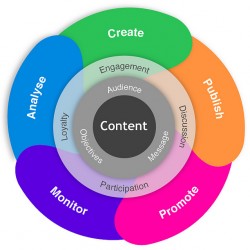The only marketing you need is a good story

Photo Courtesy: DigitalRalph
‘Content marketing is the only marketing left,’ claims Seth Godin, marketing guru and bestselling author. He’s right because if trend analysis are anything to go by, the future of trade lies right here on the Internet. However, having a website and arbitrary presence on social media sites is not enough, because on the Internet it is the quality of content that sets you apart and gives your brand a competitive edge.
The key to successful digital marketing therefore begins with a story well told, and in this respect the humble blog is your winning bet. A blog breathes life back into the salesman and replaces his sales pitch, with a well narrated encounter or experience. The communication however needs to be strategic and structured to be able to get your brand the right kind of visibility – one that converts clicks to actual sales.
And it seems to be working. The 2013 Digital Influence Report, blog ranking site Technorati found that UK retail sales directly via social media are forecast to grow to £290m by 2014 from £210m, a 44% increase in two years. Of the social media platforms, the study indicated that blogs are the biggest online sources of information to influence and generate sales.
The claim is supported by findings from a global study conducted by eBay which also highlighted the vital role social media, particularly blogs, play in influencing and driving retail sales.
So how does a mummy blogger’s rant on the lack of sleep, or a teenager’s shopping wish-list, or an accountant’s blog of his painstaking work day (etc etc) convert to sales? They do, because they are real, or at least meant to be.
One can hardly argue that reading about a personal experience, no matter how mundane it may be, is far more interesting than the cleverest sales pitch, and definitely more persuasive in establishing a perspective.
So, when the mummy blogger drops in the name of the coffee brand that helps her through the day, or the teenager discloses the ‘awesome’ deal she clinched on a pair of jeans, and the accountant mentions, hmmm, maybe also the brand of coffee that gets him through his profession, readers are taking their word for it. And marketers are ready to pay popular bloggers for these words.
In doing so, marketers have turned blogging into a real profession. While there are plenty of success stories of bloggers drawing in over £100,000 a month, an article in Forbes explained how a mere mention of a phone application can make an average blogger £5,000 richer. Holidays, shopping trips and free gadgets are just some of the other perks that often come with writing a blog about the related product or service.
However, as competition tightens in blogosphere, the risk of muddying content with a blatant sales-driven agenda has increased. Google’s updated webmaster guidelines released in June, were aimed at protecting good content, from advertising. It would benefit marketers and individual bloggers to remember that the success of the blog began with a story, and this art of storytelling needs to be kept alive.
How to turn your blog into a story that sells in 5 simple steps:
- Homework: Before getting started, make sure you do your research. Blogs are in a way, an expert’s point of view. Whether you’re a mum or a marketer, you need to make sure you know what you’re talking about.
- Make it clear: Make a list of the points you want to communicate. Remember it’s better to focus on a few key messages, rather than to have a long-winded article with a weak outlook.
- Tool up: Use keywords but not as an afterthought. You’d be surprised to find how many tools there are out there that can help you determine what the buzzwords are to empower your blog post. Click here for a check list of must-have tools.
- Let it flow: A blog is different from news. Your readers do not need to know the who, what, when where and why in the first paragraph. They want to hear an interesting anecdote, a funny example, or a surprising statistic to keep them through to the next paragraph.
- Make it personal: There is no sales pitch stronger than a personal experience or encounter. Make it personal and something your target audience can relate to.



Leave a Comment
Trackbacks & Pingbacks
[…] how can we create smart content? We discussed this in an earlier post titled ‘The only marketing you need is a good story,’ which stressed on the importance of quality content rather than a blatant marketing pitch. But this […]